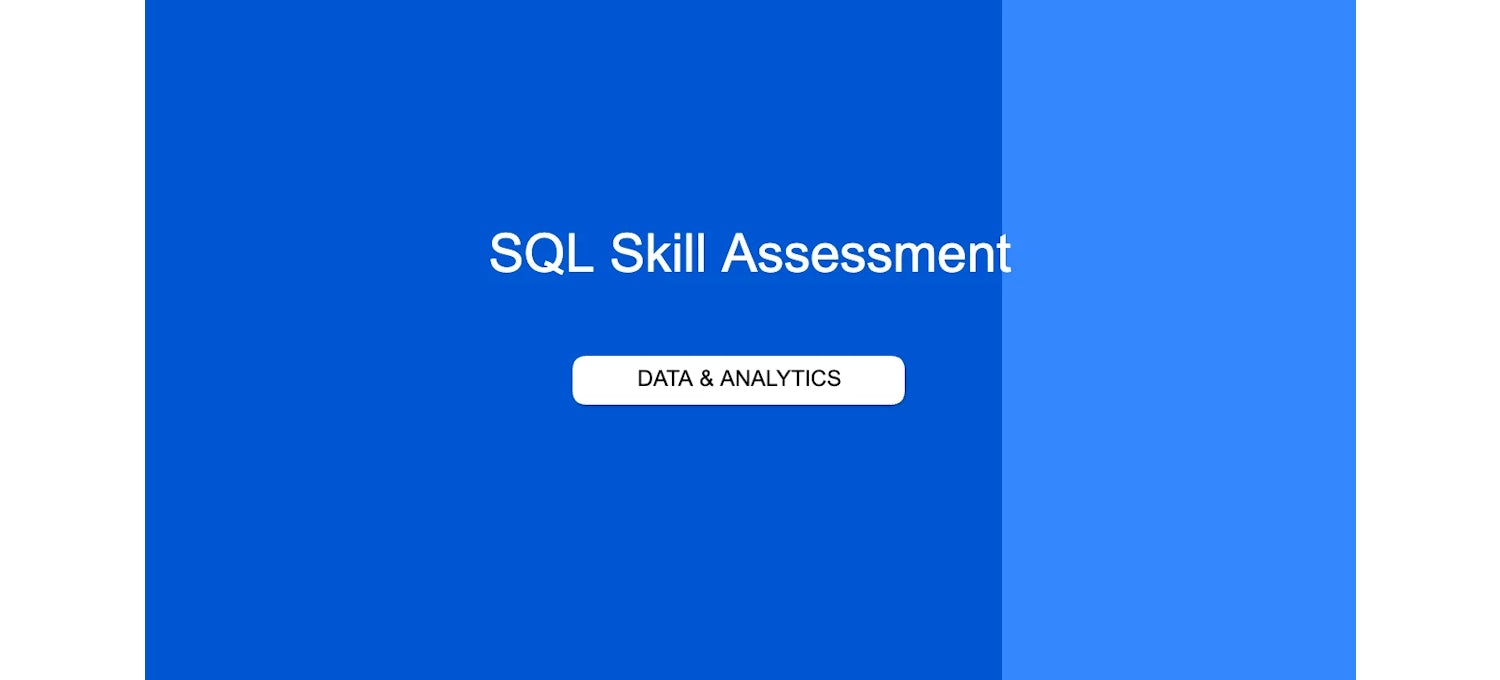SQL Skill Assessment
Test your SQL skills with this quick assessment. Answer 10 multiple-choice questions to get your score, then check the Scoring Guide to find your level and recommended learning path.

SQL Programming Quiz
The acronym SQL, pronounced either "sequel" or "S-Q-L," stands for Structured Query Language. It is a universal programming language used to manage relational databases. Answer the following skill-based SQL programming questions and click Submit to calculate your score. Use your score to find recommendations that align with your current skill level and explore career paths that interest you.
Test Structure
10 multiple-choice questions
Takes approximately 5-10 minutes
Immediate results with career recommendations
Custom learning paths based on results
����vlog�����ۿ�
1. Which SQL statement is used to retrieve data from a database?
2. What is the difference between INNER JOIN and LEFT JOIN?
3. What will this query return?
SELECT COUNT(DISTINCT department_id) FROM employees;
4. Which of these is the correct syntax for a subquery?
5. What is the purpose of an INDEX in SQL?
6. Which statement about HAVING vs WHERE is correct?
7. What will this query do?
UPDATE employees
SET salary = salary * 1.1
WHERE department_id IN (
SELECT department_id
FROM departments
WHERE location = 'New York'
);
8. What is a stored procedure?
9. Which statement about ACID properties is correct?
10. What is the purpose of a CTE (Common Table Expression)?
Scoring Guide & Course Recommendations
Your quiz score above aligns with a general proficiency level of beginner, intermediate, or advanced. Match your score to the ranges below and explore the recommended course.
0-30: Beginner Level
Skill Level: New to SQL
Recommended ����vlog�����ۿ� Courses:
SQL for Data Science by UC Davis
Basic SQL syntax
Simple queries
Data filtering
Introduction to Structured Query Language (SQL)by the University of Michigan
Database fundamentals
Basic CRUD operations
SQL Basics for Data Science Specializationby UC Davis
Fundamental concepts
Basic queries
Data manipulation
40-70: Intermediate Level
Skill Level: Familiar with basic queries, ready for complex operations
Recommended ����vlog�����ۿ� Courses:
Database Management Essentials by the University of Colorado
Database design
Normalization
Advanced querying
Data Wrangling, Analysis and AB Testing with SQL by UC Davis
Advanced analysis
Performance tuning
Meta Database Engineer Professional Certificate by Meta
Database management and manipulation
Programming with Python and Django
80-100: Advanced Level
Skill Level: Experienced SQL developer
Recommended ����vlog�����ۿ� Courses:
Data Warehouse Concepts, Design, and Data Integration by the University of Colorado Boulder
Data warehouse design
Advanced data integration techniques
Data Warehouse for Business Intelligence Specializationby the University of Colorado
Comprehensive data warehouse design
Advanced data integration and visualization
Skills Covered by Level
As you progress in your SQL programming career, different levels have different skills, and here are some common ones.
Beginner Level
SELECT statements
WHERE clauses
Basic JOIN operations
INSERT, UPDATE, DELETE
GROUP BY and ORDER BY
Basic aggregation functions
Intermediate Level
Complex JOINs
Subqueries
Window functions
Views
Indexes
Transaction management
Stored procedures
Advanced Level
Query optimization
Database design
Performance tuning
Partitioning
Security management
Backup and recovery
ETL processes
Common SQL Platforms Covered
Many relational database management systems (RDBMS) support the SQL language, including MySQL, SQL Server, Oracle, and those below.
MySQL
PostgreSQL
Microsoft SQL Server
Oracle Database
SQLite
Career Paths
Your SQL programming career path will be unique to your strengths and interests. Below are some typical roles at different skill levels. Explore our Data Science Career Paths: Career Decision Tree to understand better how your Node.js programming skills can take your career in an exciting direction.
Beginner Level: Junior Database Developer, Data Entry Analyst
Intermediate Level: SQL Developer, Database Developer, Data Analyst, Business Intelligence Analyst
Advanced Level: Database Administrator, Data Engineer, Data Architect
If you want to learn SQL, consider completing the Google Data Analytics Professional Certificate online on ����vlog�����ۿ�. You'll gain skills like Tableau, R, spreadsheets, data visualization, and SQL expertise.
����vlog�����ۿ�
Writer
����vlog�����ۿ� is the global online learning platform that offers anyone, anywhere access to online course...
This content has been made available for informational purposes only. Learners are advised to conduct additional research to ensure that courses and other credentials pursued meet their personal, professional, and financial goals.